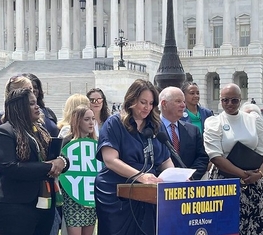The League of Women Voters of the United States joined a public statement urging Congress not to enact laws that expand federal resources for policing, prosecution, and other criminal-legal practices without accountability measures and measurable improvements in safety outcomes. It explains that a consequence of Dobbs v. Jackson Women’s Health Organization is the entry of more people, particularly women of color, into the criminal legal system, and suggests that Congress instead advance bills investing in non-carceral community safety efforts.
Statement of Concerns Regarding Police Funding Bills
Wednesday, September 21, 2022
When the United States Supreme Court issued its opinion in Dobbs v. Jackson Women’s Health Organization, it dealt a sweeping blow to abortion access and care. But this decision has another looming consequence—the pending entry of countless people, especially women of color, into a sprawling criminal-legal system. And police departments will occupy the frontlines of enforcing these new laws.
These legal shifts warrant a broad range of forward-looking policy actions that can help to safeguard reproductive care access. However, they also call for greater vigilance and scrutiny when considering policing bills like H.R. 6448/S. 3860, Invest to Protect; H.R. 6375, COPS on the Beat Grant Program Reauthorization and Parity Act; or any other bills that would expand federal resources for policing and prosecution. With the Dobbs decision bringing these carceral actors ever deeper into our lives and our most private decisions, now is not the time to pass laws that expand resources for policing programs that operate with impunity—and without measurably improving safety outcomes. As organizations that work to support women, children, families, abortion seekers, and others who are being deeply impacted by the Dobbs decision, we therefore urge you not to advance these police funding bills and, instead, to advance bills that use non-carceral investments to keep communities safe.
At this point, it is difficult to know how many women, care providers and community advocates will face invasive surveillance and criminal prosecutions following Dobbs. But given current trends, 26 states have or may soon completely or partly criminalize abortion. And these new laws will catalyze a destructive trend toward further punishing those who are most vulnerable, including criminalizing school-age youth seeking access to reproductive health care and abortions.
Over these past few years, there has been a dramatic uptick in arrests and prosecutions that relate to miscarriages, stillbirths and alleged substance abuse during pregnancy. Consider that, since Roe was issued in 1973, 75% of these prosecutions have happened since 2006—and the people targeted were disproportionately Black and Indigenous.
Once charged, these women enter a system whose effects are often life-threatening. Although many arrested individuals can afford to pay money bail and secure quick release, countless others are too poor to afford any bond amount—and because nobody asks if they can pay, they may spend months or even years sitting in jail.
Just a few days of pretrial detention can have catastrophic consequences, causing loss of housing, loss of employment, or missed medical care. In some jails, people are shackled to doorways and even wheelchairs. Medical care is essentially nonexistent. And for women, most of whom are mothers, these indignities compound the ongoing terror of losing child custody—a result that could traumatize their families for generations.
For people who are pregnant, the consequences are still more dire. Lacking pregnancy-related medical care and facing physical trauma, including invasive searches of their bodily cavities, many incarcerated women suffer miscarriages and other health consequences that put their lives and their families in jeopardy. Advocates have been leading tireless campaigns to end shackling during childbirth, but more than twenty states still permit handcuffing and chaining women while in labor. And after giving birth, these women are frequently denied not only access to basic items like breast pumps and essential medications, but also the very right to hug, hold, or even see their newborns.
Even in states that avoid criminalizing abortion seekers themselves, these oncoming laws will sweep thousands of community-based advocates, care providers and family members into carceral structures. Moreover, the drive to enforce these laws will involve expanding online and other surveillance systems that endanger our most basic civil liberties, triggering a dramatic growth in policing and prosecution systems nationwide—systems that, if the Supreme Court erodes additional liberties including our rights to same-sex marriage, contraception, and more, could soon be applied to policing these new crimes.
In these coming months, as states rush to pass new restrictions, this is the criminalization regime that police and prosecutor offices will be enforcing. For this reason, we urge Congress to avoid enacting laws that will only expand resources for policing, prosecution, and other criminal-legal practices that will put thousands of women, families, children, abortion seekers, and others into jeopardy. We cannot claim to help these communities while expanding a criminal enforcement structure that puts our most vulnerable people at mortal risk.
Signed,
See attached letter for complete list of signatories
Sign Up For Email
Keep up with the League. Receive emails to your inbox!
Donate to support our work
to empower voters and defend democracy.





